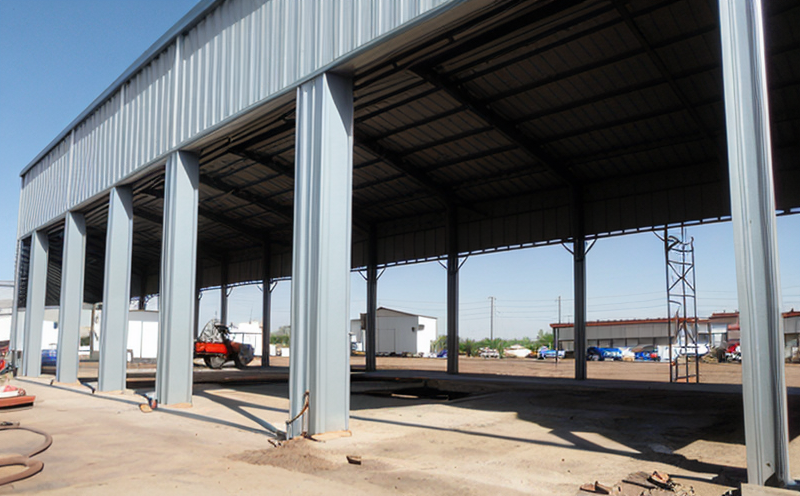ISO 6892 Structural Steel Testing
The ISO 6892 series of standards provides comprehensive guidance on mechanical testing and materials characterization, focusing on the properties and behavior of metals under various loading conditions. This service is specifically tailored to meet the stringent requirements for structural steel in building and infrastructure sectors. Compliance with these standards ensures that materials used are robust enough to withstand the dynamic stresses encountered during construction and operation.
Our testing adheres strictly to ISO 6892:2015, which encompasses a wide range of mechanical tests including tensile strength, yield point, elongation, hardness, impact toughness, and fatigue properties. These parameters are crucial for ensuring that structural steel meets the required standards for safety and longevity in buildings and infrastructure.
For our clients, this means precise control over specimen preparation to replicate real-world stress conditions accurately. Specimens undergo rigorous surface treatments and heat treatment processes before being subjected to mechanical testing. Advanced testing equipment such as universal testing machines (UTMs) equipped with specialized grips ensure accurate data capture under controlled environments.
The results from these tests not only help in quality assurance but also contribute significantly towards product development by providing critical insights into material behavior under different loading scenarios. Compliance officers responsible for ensuring regulatory adherence will find this service particularly useful as it offers robust documentation supporting the use of compliant materials across various projects.
Our facility employs highly skilled technicians who are certified to perform these tests according to international standards. They work closely with project teams from inception through final report generation, ensuring seamless integration into existing workflows without disrupting timelines or budgets.
To give you a better understanding of how ISO 6892 applies in practice, let’s delve deeper into some specific applications within the building and infrastructure sectors:
- Structural Integrity Checks: Ensuring that newly fabricated components meet specified design loads before installation.
- Material Quality Control: Verifying incoming materials against agreed-upon specifications prior to use in construction processes.
- Research & Development: Providing data points necessary for continuous improvement of manufacturing techniques and product designs.
Industry Applications
The primary application area for ISO 6892 Structural Steel Testing lies within the building and infrastructure sector, where structural integrity is paramount. This service finds significant use in:
- New Construction Projects: Before any steelwork is installed, it undergoes rigorous testing to ensure compliance with local codes and standards.
- Renovation & Retrofitting: Existing structures often require reinforcement or replacement of certain elements. Testing ensures that new additions do not compromise the overall stability of the building.
- Material Suppliers: Manufacturers rely on these tests to prove their product meets specified performance criteria, thus enhancing market credibility.
In addition to these direct applications, ISO 6892 testing plays an integral role in R&D efforts aimed at developing next-generation structural steels. By providing consistent and reliable data, this service helps researchers identify potential improvements in material composition and processing methods.
Environmental and Sustainability Contributions
Compliance with ISO standards like ISO 6892 contributes positively to environmental sustainability by promoting the use of durable, high-performance materials that minimize waste throughout their lifecycle. Here are some key ways in which this service supports sustainable practices:
- Promotes Efficient Use of Resources: By ensuring that only materials capable of meeting strict mechanical performance criteria are used, there is less likelihood of failures leading to premature replacement.
- Reduces Energy Consumption During Construction: Robust structural components reduce the need for additional supports or modifications later on, streamlining construction processes and lowering overall energy consumption.
- Prolongs Useful Life of Structures: Properly tested materials contribute to longer-lasting buildings which in turn reduces the frequency of maintenance activities and associated environmental impacts.
Competitive Advantage and Market Impact
Adhering to ISO 6892 Structural Steel Testing offers several advantages that can significantly enhance a company’s competitive position:
Enhanced Reputation: A commitment to high-quality testing demonstrates a firm's dedication to excellence, thereby building trust among clients and stakeholders.
Informed Decision Making: Accurate test results guide informed decisions regarding material selection, thus reducing risks associated with substandard products.
Competitive Edge in Tendering Processes: Demonstrating compliance through rigorous testing can set a company apart from competitors during bid evaluation phases.
In today’s competitive market environment, staying ahead requires more than just delivering quality products; it involves showcasing how you maintain and improve those standards consistently. Our service ensures that your company remains at the forefront of innovation within its industry segment.





